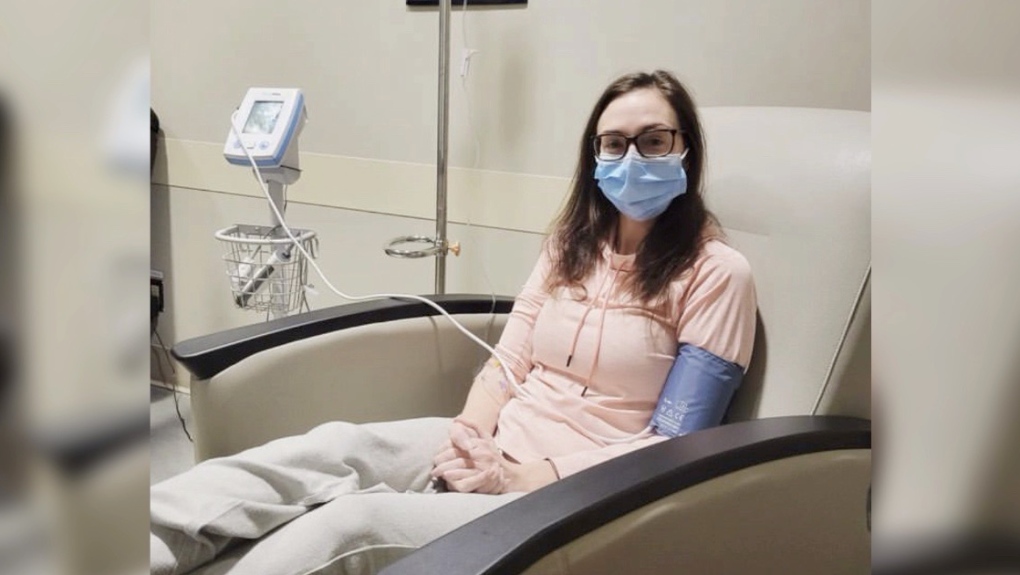Ontario government should fund fertility treatments, advocates say
For Tara Wood, the decision to abandon fertility treatments in the hopes of getting pregnant came down to money.
After two unsuccessful rounds of in vitro fertilization (IVF), and three of intrauterine insemination (IUI), Wood knew she couldn't afford to go on.
Advocacy group Conceivable Dreams, of which Wood is a board member, wants Ontario to offer more financial support to those relying on fertility treatment to have a child as a new survey released by the group on Wednesday shows the severity of the issue.
Eighty per cent of those who answered a survey of fertility treatment patients on the Conceivable Dreams' website said they required services not covered by the province. Over a third, 34 per cent, spent more than $30,000 to try and conceive.
The government says it spends $70 million each year to help 13,000 patients with fertility treatments.
Since 2015, the province has covered one cycle of IVF for those under 43, a treatment that costs about $20,000. But there's no support to pay for the $5,000 worth of drugs associated with a round of treatment or travel expenses.
Conceivable Dreams is calling on the province to establish a tax credit to help with the cost of fertility drugs and travel associated with their treatment. They'd also like fertility program patients in northern Ontario to be able to claim an existing grant to cover travel costs to access healthcare.
"This isn't a nice to have, this is a need to have if we want to allow people to continue to have families, continue to support them, and continue to replenish our population," Wood tells CTV News Toronto.
The World Health Organization estimates that one in six adults worldwide experiences infertility.
The fact that it can take two to three rounds of IVF to achieve pregnancy, and that Ontario clinics are clustered in urban centres can add to the financial, emotional, and physical drain.
 Renée Higgins of Sudbury said becoming a mother has cost her a lot."When you're going through treatment, you need to be in clinic multiple times a week, so you might be driving to Toronto or staying there for two weeks if you need to, to make sure that you're there for your ultrasound, your bloodwork," Wood explains.
Renée Higgins of Sudbury said becoming a mother has cost her a lot."When you're going through treatment, you need to be in clinic multiple times a week, so you might be driving to Toronto or staying there for two weeks if you need to, to make sure that you're there for your ultrasound, your bloodwork," Wood explains.
In a statement a spokesperson for Health Minister Sylvia Jones writes:
"Our government knows some Ontarians are spending too much time trying to navigate the healthcare system and travelling too far to access care, that is why we are continuing to improve the Ontario Fertility Program in underserviced areas of the province to ensure patients and their families can have convenient access to treatment and care wherever they live.”
Renée Higgins of Sudbury is grateful there is help from the government but her journey to become a mother has cost her a lot.
The emotional and physical strain of six rounds of IVF, waking up in the dark to make 8 a.m. appointments in Markham, remortgaging her home, and paying $100,000.
Last year, she was surprised to find a stuffed envelope in her mailbox, in response to an application to the Northern Ontario Travel Grant.
"When I opened the envelope, I started crying. It was thick because there were denial letters," Higgins tells CTV News Toronto.
"There's so much more that we can do to help make it easier for people to build their families."
CTVNews.ca Top Stories
Here's where Canadians are living abroad: report
A recent report sheds light on Canadians living abroad--estimated at around four million people in 2016—and the public policies that impact them.
What is a 'halal mortgage'? Does it make housing more accessible?
The 2024 federal budget announced on April 16 included plans to introduce “halal mortgages” as a way to increase access to home ownership.
'We are declaring our readiness': No decision made yet as Poland declares it's ready to host nuclear weapons
Polish President Andrzej Duda says while no decision has been made around whether Poland will host nuclear weapons as part of an expansion of the NATO alliance’s nuclear sharing program, his country is willing and prepared to do so.
Deadly six-vehicle crash on Highway 400 sparked by road rage incident
One person was killed in a six-vehicle crash on Highway 400 in Innisfil Friday evening.
Invasive and toxic hammerhead worms make themselves at home in Ontario
Ontario is now home to an invasive and toxic worm species that can grow up to three feet long and can be dangerous to small animals and pets.
Harvey Weinstein hospitalized after return to New York from upstate prison
Harvey Weinstein’s lawyer said Saturday that the onetime movie mogul has been hospitalized for a battery of tests after his return to New York City following an appeals court ruling nullifying his 2020 rape conviction.
Opinion I just don't get Taylor Swift
It's one thing to say you like Taylor Swift and her music, but don't blame CNN's AJ Willingham's when she says she just 'doesn't get' the global phenomenon.
Central Alberta queer groups react to request from Red Deer-South to reinstate Jennifer Johnson to UCP caucus
A number of LGBQT+2s groups in Central Alberta are pushing back against a request from the Red Deer South UCP constituency to reinstate MLA Jennifer Johnson into the UCP caucus.
Mookie Betts leads Dodgers past Blue Jays 4-2; Toronto drops fifth consecutive game
Mookie Betts went 3 for 5, including a triple and an RBI single, as the Los Angeles Dodgers beat the Toronto Blue Jays 4-2 on Saturday.































